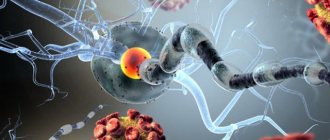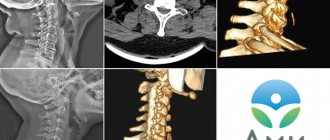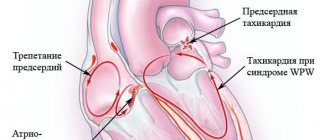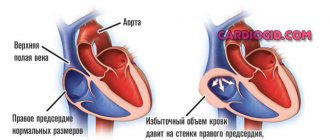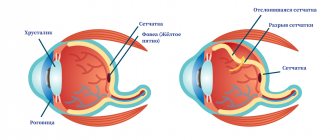Causes of Memory Loss
- Certain injuries and pathologies of the brain - these include, for example, cancer, traumatic brain injury, stroke;
- Disruption of certain systems of the human body;
- Negative factors - sleep problems, stress, lifestyle changes, increased brain load, incl. for memory;
- Addictions – alcohol, nicotine, drugs, systematic use of sedatives;
- Age-related changes that reduce memory function.
Diagnosis of memory disorders
Before prescribing treatment, the patient requires a systemic examination. The doctor conducts a conversation to collect anamnesis. During a conversation with the patient, he determines:
- period of pathology development;
- factors that caused disruption of brain activity;
- the presence of episodes of temporary memory loss in earlier periods of life.
After collecting anamnestic data, the physician performs a neurological examination, establishing:
- skin condition;
- gait characteristics;
- presence of oscillatory eye movements.
A patient suffering from memory loss due to a concussion fills out the necessary questionnaires and talks with a psychiatrist to diagnose intellectual and emotional problems. Electroencephalography, CT and MRI of the head are performed.
Diseases that cause memory problems
Memory impairment often appears as a result or symptom of various diseases. They are often caused by traumatic brain injuries. People who receive them note memory impairment, the degree of which directly depends on the severity of the injury. Traumatic brain injuries can lead to various types of amnesia - retrograde or anterograde. The patient may not remember either the moment of injury or the period preceding it. Sometimes memory loss is combined with the appearance of hallucinations and false memories.
The most common causes of memory problems include disruption of normal cerebral circulation. Atherosclerosis of blood vessels leads to a decrease in blood flow in all parts of the brain, and this often provokes an acute cerebral circulatory disorder. A stroke developing in one of the brain zones cuts off the blood flow to it. This leads to impaired brain activity and memory loss. Similar symptoms also occur if a person suffers from diabetes.
It's a different story with diseases that are transmitted genetically, including Alzheimer's disease. It cannot be cured, but competent therapy and care slow down the development of the disease, minimize the consequences and reduce the risk of complications.
Memory also becomes worse due to diseases of the thyroid gland, leading to iodine deficiency in the human body. This is accompanied by a tendency to obesity, apathy, depression, excessive irritability, and swelling of muscle tissue. You can avoid such manifestations if you choose the right diet, which includes frequent consumption of iodine-containing foods, as well as persimmons, seafood, seaweed, hard cheese, and nuts. The diet also includes a variety of dairy products.
But forgetfulness is not always a pathology of memory, because quite often a person consciously tries to forget difficult life situations, negative events, and tragedies from memory. In this way, the body protects its psyche and reason. If a person throws out the negative things that happened to him from his memory, then this phenomenon is called repression; he believes that certain events did not happen - denial, and if he chooses another object to displace negative emotions - replacement. Suppressed and forgotten negative emotions that have not found a way out often turn into prolonged depression and neuroses.
Classification
Depending on the degree of memory loss, amnesia can be complete or partial. In the first case, a person cannot remember anything from a period of his life, and in the second, he observes vague fragments of events. There is also selective or local amnesia, when the patient loses only a specific skill. This condition is characteristic of psychogenic disorders. According to the time of forgetting, this deviation can be:
- retrograde in the absence of memory for everything that happened before the onset of the disease;
- anterograde, when everything that happens after the first signs of the disorder is forgotten;
- combined (combines retrograde and anterograde amnesia);
- fixation – forgetting what is currently happening, usually lasts for 2-5 minutes.
The type of course of amnestic syndrome can be:
- regressing with gradual recovery;
- stationary, in the absence of positive dynamics and without signs of deterioration, forgetting usually applies only to a certain situation;
- progressive – gradual loss of memory up to its complete loss.
There is also retarded memory loss, when a person’s events are erased some time after stress, acute psychosis or traumatic injury. Immediately after regaining consciousness, he talks about what happened, but later forgetting sets in.
Symptoms indicating memory impairment
Memory bells that should alert you:
- forgetfulness, manifested in everyday matters;
- difficulty focusing on a specific object;
- problems with learning and remembering information, with its reproduction;
- disruption of the thought process, loss of logical connections, loss of mental acuity;
- confusion and uncertainty;
- autism, social maladjustment;
- foggy consciousness.
Often, memory problems begin against the background of deteriorating general health. However, they can be combined:
- with headaches;
- with pressure surges;
- with hand tremors;
- with muscle spasms;
- with dizziness;
- with a decrease in visual acuity.
If, in the presence of 2-3 of the above problems, memory has decreased, you should urgently seek medical help, since these symptoms signal rapidly developing brain pathologies.
Examination of patients with cognitive deficits
To determine the severity of memory disorders in older people, special testing methods are used that allow one to evaluate the following parameters:
- Orientation in time and space: the doctor asks to name today’s date when famous historical events took place, list the main geographical concepts, and talk about cultural attractions.
- Perception and memory. The patient is told words or numbers that are not related to each other, shown pictures, then asked to repeat them randomly or in a certain order immediately and after 15–20 minutes.
- Ability to concentrate. This is usually a request to perform simple arithmetic operations.
- Speech. The patient is asked to answer the questions asked, and the doctor evaluates how exactly he composes sentences and whether he uses various literary devices (comparisons, metaphors, jokes and aphorisms).
- Reading and reproduction of what has been read. The patient is asked to read the proposed text and retell it in his own words.
- Writing and drawing. The test consists of writing from dictation or describing any experienced situation, depicting an animal, person or any object or natural phenomenon.
The test results are assessed based on the total points for each task.
Additionally, a comprehensive examination is required:
- clinical and biochemical blood test, coagulogram, lipidogram;
- determination of glucose level, glucose tolerance test;
- assessment of the function of the thyroid gland and other endocrine glands;
- Ultrasound of the abdominal organs, heart;
- Dopplerography of the great vessels, and, if indicated, tomography of the brain.
If necessary, doctors from the Leto clinic are invited to consult highly specialized specialists.
How a neurologist treats memory
Before starting treatment, it is necessary to understand what disease caused the problem. Medicines should be used only those prescribed by your attending physician; self-medication is unacceptable. It is optimal to undergo a complete diagnosis of brain activity, vascular health, and electroneuromyography.
It should be remembered that rapid memory deterioration in itself is not a disease; this symptom only warns of the emergence of a more serious disease that needs to be diagnosed and therapeutic or radical treatment begun. This will help restore the previous quality of life, prevent the patient from separating from society and deteriorating adaptive functions. When memory impairment is detected, nootropic drugs are usually prescribed.
Treatment methods
To combat amnesia, doctors use an integrated approach, which involves both psychotherapeutic influence and drug therapy.
Treatment of amnesia is carried out under the strict supervision of a doctor, taking into account the reasons that provoked the onset of the disease. Today, a lot of methods and techniques have been developed, and many medications are produced to help solve this problem. At the same time, special exercises are used to train memory.
How to improve memory. Recommendations from the Neuroscience Center
If you observe alarming symptoms in yourself or in people close to you, indicating memory problems similar to those indicated above, then you need to go to an appointment with a neurologist, neuropsychologist or therapist and undergo a series of special diagnostic tests. If you want to immediately start fighting an undesirable phenomenon before receiving the doctors’ verdict, then take action - start training your memory.
Here are some exercises to improve memory:
- If possible, perform your usual tasks with your eyes closed, from memory;
- If you are a left-handed person, do everyday tasks with your right hand, if you are right-handed, then with your left. Try this rule, for example, writing, ironing clothes, drawing, etc. – You will soon feel a positive result;
- learn Braille, which is used by blind people when reading, or learn sign language - this is useful for memory and can be useful in life;
- type texts on the keyboard with both hands, using all fingers;
- do some handicrafts - start embroidering or knitting;
- learn foreign languages and speak them more;
- try to distinguish the denomination of coins blindly, feeling them with your hands.
In addition, expand your range of interests, read more, visit places and institutions you have not been to before, go to plays and performances, walk in parks, meet and communicate with people, make new friends.
Perform the recommended exercises, follow the listed rules, take care of your health, and your memory will not fail you until old age!
Memory treatment in older people
Increased forgetfulness often worries older people. This disease occurs in 20% of old people over the age of 65 years. Against the background of this problem, absent-mindedness and amnesia develop. This condition cannot be ignored, since it causes Alzheimer’s disease – dementia. Therefore, it is recommended that even with partial memory loss in older people, treatment should begin immediately after an accurate diagnosis has been made.
Memory lapses in older people: causes
If an old person has memory lapses, treatment in such a situation is recommended to begin urgently. Today, the causes of this problem may be:
- Injury.
- Hemorrhage, trauma, concussion.
- Alzheimer's disease (partial memory loss may occur). Therapy for this pathology is prescribed by a neurologist.
- Epilepsy.
- Oncology.
- Formation of atherosclerotic plaques inside cerebral vessels.
- Chemotherapy treatment.
- Prolonged depression.
- Insomnia.
- Disruption of metabolic processes due to the fact that a person was constantly on a diet.
- Mental disorder.
- Effect state (memory amnesia treatment is effective).
The neurologist, determining the cause of the disease, conducts a conversation with the patient, prescribes a full examination and certain diagnostic methods. Memory impairment in old age, treatment at a neurological medical center involves the implementation of a whole range of measures aimed at identifying the presence of pathologies and other factors that provoke the development of partial or complete amnesia. After diagnosis, a medical specialist selects a treatment for memory loss for the elderly.
Diagnostic methods
For memory lapses in older people, treatment is prescribed at the first manifestations of forgetfulness, but before that it is necessary to carry out a diagnosis to determine whether restoration of cognitive functions is possible. When examining a person with memory loss, the following diagnostic methods are prescribed:
- General blood and urine analysis.
- Dopplerography.
- EEG.
- CT scan.
- TCD (check of cerebral vessels).
After an accurate diagnosis is made, the neurologist prescribes medications and additional therapy.
What memory disorders are there?
Amnesia is determined by the amount of forgotten information and can be of the following types:
- Selective.
- Global.
- Sudden.
- Gradually developing.
- Retrograde.
- Anterograde.
- Long lasting.
- Short-term.
Also visual - a person does not remember people he previously knew.
Symptoms
Forgetfulness is a long and gradual process. Therefore, it is not always possible to notice the development of a memory disorder at the initial stage. This condition is characterized by such manifestations as:
- Constant headache due to head injury.
- Weakness, malaise.
- Tremor.
- Ataxia (lack of coordination in movements).
- Absent-mindedness.
- Inability to assess the situation, events.
- Critical fatigue due to illness.
- Apathetic state.
- Depression.
- Darkness of consciousness.
- Speech disorders.
If the listed problems with well-being are observed, urgent treatment for memory loss in old age is necessary, since there is a high risk of leaving home and not returning.
Short-term amnesia
In 70% of patients who experience forgetfulness, the cause of this problem is the deterioration of the central nervous system. Due to the slow renewal and formation of neurons, metabolism is disrupted, which often causes short-term amnesia. It is also possible to suddenly lose memory due to the peculiarities of physiology and psychology.
- Constant mental activity.
- Chronic malaise.
- A blow or bruise to the head.
- Neurological disease.
- Disorders of blood circulation in the brain.
- Parkinson's disease.
- Alzheimer's disease.
- Long-term intoxication of the body.
- Inactive lifestyle.
- Disturbance of metabolic processes.
- Poor diet.
- Presence of invasive diseases.
Psychological reasons:
- Depressive state.
- Constant worry, nervous state.
- A rare vacation
- Prolonged asociality, lack of communication with people, loneliness.
Often, forgetfulness in old people is caused by stroke, ischemia and alcoholism. If help is not provided for short-term amnesia, the pathology will lead to disruption of brain function. Due to poor functioning, the entire body ceases to function normally. For this reason, memory treatment in older people must be carried out comprehensively.
Treatment of memory loss in older people
Amnesia should not be treated with medications alone. Complex therapy is needed. In general you need:
- Get examined annually.
- Monitor blood pressure.
- Stop drinking alcohol and smoking tobacco.
- Eat a balanced diet (preferably switch to proper nutrition).
- Take vitamin and mineral complexes.
- Sleep at least 7 hours.
- Develop intelligence (you can solve crosswords, study foreign languages, read, in general - develop thinking and logic).
- Do exercise therapy (physical therapy).
As the pathology progresses, neurologists recommend:
- practice drawing and/or singing;
- constantly discuss with the patient various topics, biography, events, important dates (necessary for the brain to work as much as possible);
- keep a diary and record events in it;
- walk every day;
- discuss a movie or program you watched, read, etc.
All these recommendations are very important to follow, since they are aimed at brain function. Thanks to systematic, constant physical activity, an interesting recreation program and communication, the symptoms will decrease and the general condition of the old person will improve.
Treatment with medications
Memory treatment for the elderly is necessarily carried out with antipsychotic drugs that stimulate brain activity. The neurologist prescribes them first. The treatment complex also includes antipsychotic medications that suppress the patient’s excessive emotionality, improve his mental state (make it more active) and other signs of psychosis. At the same time, the drugs do not negatively affect neurons. In addition to the listed groups of medications, antidepressants are prescribed, which include Mianserin and Fluoxetine. If the patient suffers from insomnia, he is prescribed sleeping pills that will help restore strength.
The modern pharmaceutical market offers quite a few medications for the treatment of amnesia in the elderly. The most effective proven medications today are:
- Actovegin, Piracetam, Gliatilin. These three medications are aimed at improving the activity of the brain, the processes of interaction between its cortex and the nervous system. They protect brain neurons from destruction.
- Trental, which improves blood circulation in the brain.
- Glycine is a brain activator.
Sometimes patients with amnesia experience relapses. In such cases, the neurologist prescribes the homeopathic remedy Tanakan. It must be taken constantly, since such drugs act after long-term accumulation in the body and contain natural plant components.
Important information! Medicines can cause various side effects. In old age, it is advisable to avoid them in order to avoid serious health problems that can lead to death. Therefore, it is extremely important to be under the supervision of a medical specialist during therapy.
How else can you help someone with amnesia?
To improve the concentration of attentiveness, you can start taking homeopathic medications (they contain only natural ingredients and herbs), which have no restrictions on their use. These include Gingko Bilobil, Omega-3, Vitrum, Aminalon, Vitamin C, B, E, Folic acid.
It is important to follow your diet. Every day, a person who has memory loss should eat vegetables, fruits, and, if the season allows, berries.
Certain foods that definitely need to be included in the daily menu improve brain function:
- Walnuts.
- Sea kale.
- Broccoli.
- Dark chocolate (from 65%).
- Fermented milk products containing a low percentage of fat (kefir, yogurt, etc.).
By prescribing competent drug therapy, proper diet and active stimulation of brain activity, in some cases it is possible to practically eliminate such a problem as memory loss.
Exercises to improve memory
Today, medical centers treating sclerosis are developing innovative treatment methods. But it is important to train your memory, for example, with the help of special simulators. Each patient has his own characteristics of the body and the course of the disease, so the neurologist selects an individual set of exercises and games. Learning processes and progress are recorded by a special computer program. Training in combination with drug treatment of memory in old age can improve brain activity, develop logic and minimize forgetfulness (to the extent possible in each specific case). It is recommended to read special books that improve memory.
Memory loss in people in old age is a pathology that requires complex therapy and constant monitoring by doctors. This is the only way to achieve a positive impact. It is important to follow all the neurologist’s recommendations and diet. If the patient is treated at home, most of the responsibility for a positive result lies with his relatives, since they must monitor the implementation of all instructions: taking medications, diet and exercise. The best solution would be to place a person with memory loss in a special rehabilitation medical center, where he will be under medical supervision. This way the treatment result will be as positive as possible.
Our rehabilitation center invites you to make an initial appointment if you or a loved one has amnesia. You can find out detailed information about the disease and treatment in our clinic by calling the phone number listed on the website.
Where can you improve your memory in St. Petersburg
Where should you go if it becomes clear that memory impairment is affecting your quality of life and you urgently need to take action? Why did my memory deteriorate? A specialist neurologist at our Center for Neurology, Professor Zhulev, can answer these questions.
Make an appointment with a doctor using the phone number listed on the website. If you notice that your ability to remember dates, faces and other data has sharply deteriorated, then you need to undergo an examination and identify the reasons. Don't let your health take its course. If memory has sharply deteriorated, then this is a signal from the body about problems that have arisen, and the sooner the doctor diagnoses them, the better.
We are located in the Central district of St. Petersburg, the work schedule and map can be found in the Contacts section.
What is dementia?
Dementia (acquired dementia) occurs as a result of gradual organic damage to brain cells due to various reasons, which we will discuss in more detail below. The irreversible process of death of brain cells causes a gradual deterioration of memory (primarily short-term) and a decrease in a person’s mental abilities. At first, the symptoms are almost invisible (it all starts with mild forgetfulness), they gradually increase until a complete and irreversible collapse of the personality occurs.
Dementia is:
- loss of the ability to reason sensibly, the ability to think;
- the complete lack of control of a patient with dementia over his emotions;
- inappropriate behavior, especially in the later stages of the disease.
Acquired dementia is always irreversible: dead brain cells are not restored. That is why the most important thing is timely (the earlier, the better) diagnosis and treatment. The sooner treatment is started, the earlier the pathological process will be stabilized and the longer the patient will be able to maintain a clear mind.
Currently, the causes of senile dementia are well studied. They are divided into two groups: hereditary and environmental (environmental causes).
Transient and permanent amnesic syndrome
Transient amnesia is observed with a number of deviations associated with various factors, it happens:
- Transitional global. It is observed in middle-aged and elderly people, more often in males, and lasts for several hours (from 4 to 12). In this case, patients do not lose their identity, but they experience confusion. However, there is no evidence of cerebral ischemia. During the study, the patient demonstrates a profound loss of memory for all events occurring at the time of the attack. A return to the original state is observed within 1-2 weeks to 2-3 months.
- Transitional epileptic. Occurs in patients with epilepsy, sometimes amnestic syndrome manifests itself as the first sign of the disease before the onset of seizures.
- Injuries and head injuries. Typically, after a TBI, an episode of temporary retrograde amnesia is observed; the longer it lasts, the more negative the prognosis, and the likelihood of cognitive impairment, mental disorders, and social problems increases. Post-traumatic syndrome also includes anxiety, irritability and complaints of somatic pathology.
- Alcohol blackouts. Memory lapses associated with alcohol abuse mean that a sober person cannot remember events when he was drunk. But after drinking a strong drink, they easily return.
Complete memory loss is observed in progressive diseases that cannot be completely cured. This happens with dementia, mental illness, inoperable brain tumor and other disorders. Therapy in this case is to stop the deterioration of the condition and take measures to adapt the patient to his amnesia.
Manifestations of amnestic syndrome
A classic sign of amnesia is the inability of a person to recall a certain period of time in his life. Most often, recent events are forgotten first, and then more distant ones. In a regressing process, recovery is observed in the reverse order. Some types of disorder involve false, fictitious memories, or confabulations. With their help, the body tries to fill the gaps. At the same time, the person sincerely believes in the truth of his “memories.”
Amnestic syndrome after a stroke is characterized by hypo- and paramnesia (general memory loss and confusion of present and past events). At the same time, speech impairment and movement deficits are noted. Memory loss occurs in psychoorganic syndrome, and cognitive dysfunction is also observed. A person loses the ability to assimilate new information, his attention decreases, and his thought processes slow down. With dissociative amnesia, the patient becomes absent-minded, begins to wander, and often experiences affective disorders. Transient global loss of memories is characterized by complete disorientation. With Korsakoff's syndrome, several types of amnesia are often combined.
With a stationary disorder, a person often suffers and worries about his condition, is tormented by a feeling of guilt, and becomes depressed. Progressive amnestic syndrome leads to complete helplessness; a person can leave home and get lost in a familiar area. There is a gradual loss of skills and knowledge. At the end there is complete disorientation and constant care is required.
